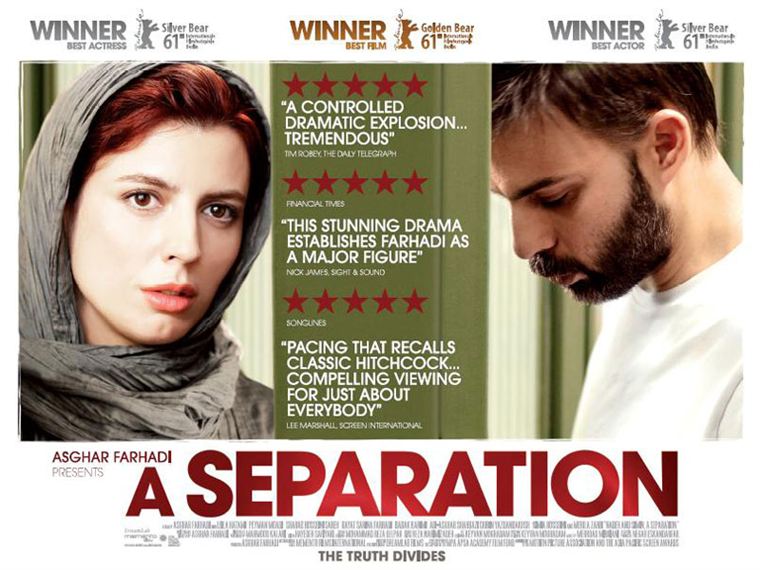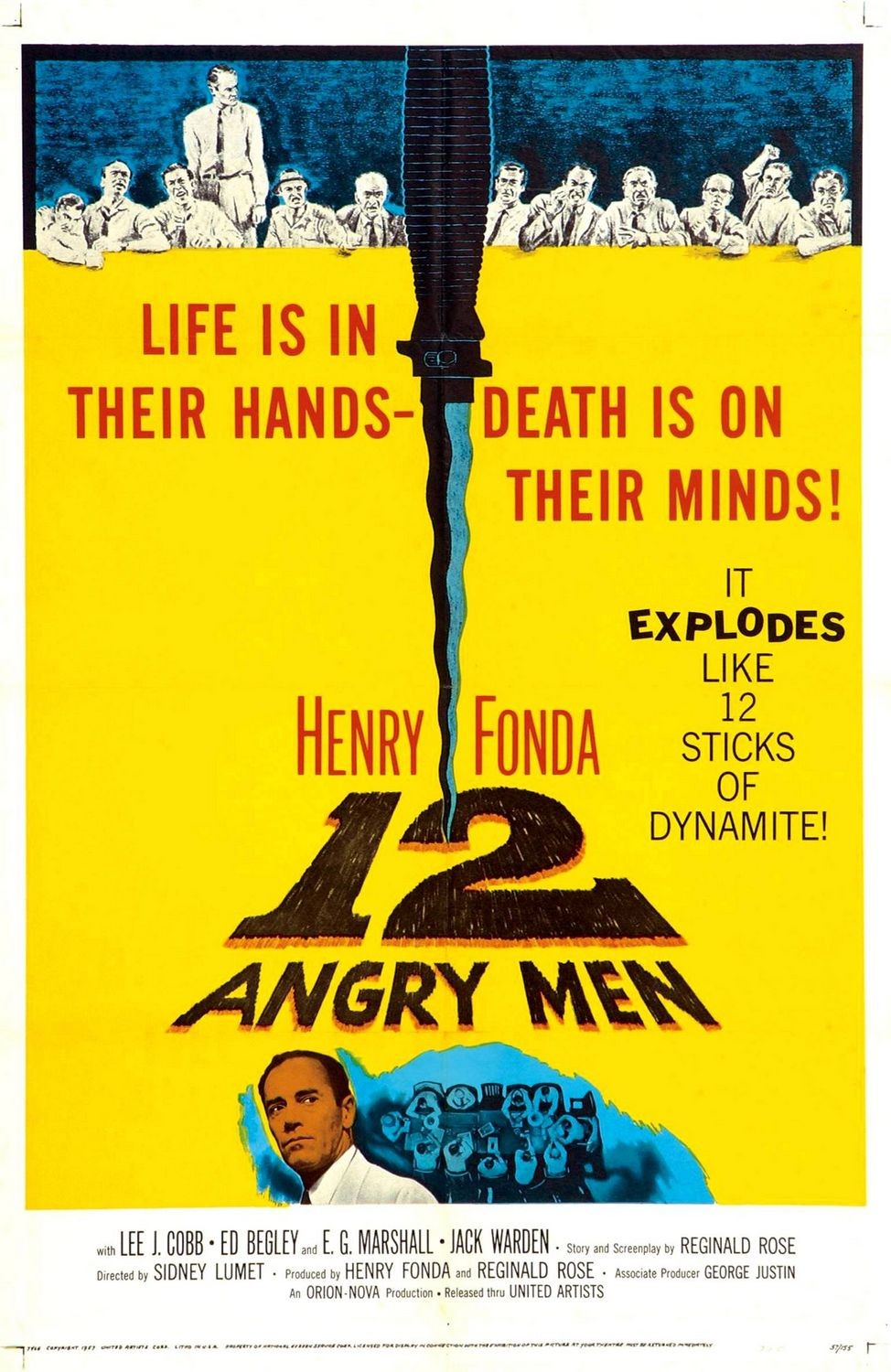The IMDB trivia section for the 2012 best foreign language Oscar nominated, "A Separation" offers a few surprising clues towards the film's remarkable appeal to a majority of audiences neither familiar with its language nor its setting.
It's shot almost entirely with a handheld camera adding refreshing energy to dramatic action within the frame, quite the opposite of modern Iranian cinema which came to be identified with classical, locked composition shots complimenting the slow pacing.
Secondly, it is the first ever film to win three Bears from the Berlin International Film Festival, taking the top honors in acting for both male and female leads and also best film.
The most intriguing surprise however, one that made quite a few cinema lovers sit-up and take notice was its Oscar nomination for best original screenplay.
I have no doubt that should the film manage the unthinkable and bag the win for best original screenplay it will definitely lead to subsequent focus purely on the writing aspect. Currently though, it is a bit difficult to source details about the actual approach and thought process of writer/director Asghar Farhadi while he was crafting the screenplay.
It almost seems a bit downplayed in interviews he's been a part of despite having sneaked into a category dominated by veteran and highly talented screenwriters.
In a brief online interview the full details of which can be found here, he explains the film's acceptance by people the world over thus:
"Marriage is a form of relationship between two human beings, unrelated to the period or society in which it is set. And the issue of human relationships is not specific to a given place or culture. It is one of modern society’s most essential and complex concerns. So I feel that the subject of the film makes it accessible to a wider public, beyond geographical, cultural or linguistic frontiers."It's actually not that simple, to me at least.
True, the thematic elements have a universal appeal. In fact, quite a few films achieve this every few years but rarely do they achieve the kind of following that has the common public, lovers of cinema and noted film critics go as far as stating this as the best film this year and one of the best films ever, even.
Mere thematic elements can't achieve this!
It then takes a bit of sifting through what I figure is Mr. Farhadi giving the same tired response to numerous interviewers asking the same question.
In that same interview above, here's a tiny detail he slips in as he talks about working with his actors:
"We took our time to rehearse, working from a very detailed screenplay, which we followed precisely, to enable each actor to understand the different dimensions of their character. This approach may very well come from my experience with the theater. It doesn’t mean propositions or opinions are forbidden, but we agreed that rehearsals were the only place to discuss. Once we started shooting, we agreed that variations would be minimal."Mr. Farhadi mentions a detailed screenplay which is, followed precisely, and ends that quote by stating variations during shoots would be minimal.
A screenplay that tight, that rigidly followed, especially in a feature film, not only speaks about the confidence of a director in his written craft but also about the effort that has gone into getting every nuance and detail absolutely spot on as he's writing it, and then re-writing it umpteen times before he feels it's ready.
It therefore came as no surprise that in this wonderful interview when asked about his favorite part of the filmmaking process he states:
"Writing. For me nothing is more enjoyable thank thinking about creating a story. Writing is like being in a world where everything belongs to you. You have full power over the characters to create whatever you want."Not only is it his favorite aspect in the filmmaking process it also is frustrating for him:
"When you’re writing, you have full control over everything. But when you try to bring that to action, you run into certain constraints. Not everything comes out the way you imagined.""A Separation" is a film that takes the ordinary, casual details in a human relationship within a day-to-day setting and injects conflict in the most wonderfully innovative ways possible, thus making the viewer not a mere spectator but a thoroughly involved spectator.
"I don’t want the audience to think they’re watching an “important” scene and to try to remember it as a result. This whole game of making the audience go back and remember these simple little details makes them more engaged in the film."At face value this seems so simple a statement!
If you think about his choice of words however, isn't it remarkable that he uses simple innocuous narrative technique but yet connects it brilliantly to something that has either occurred quite a while back in the plot, or something that will successfully resolve a nagging plothole that you anticipate?
Which brings me to the fifteen minutes within the film where an extraordinary sequence is triggered by a mere phrase of dialog and is a great example of script-writing quite different for a genre of this sort.
Almost an hour and fifteen minutes into a the film, one of the titular characters, Nader returns home with his 11-year old daughter and his geriatric father suffering from Alzheimer's.
The setting is the stairwell, the stair landing and the vestibule right outside his apartment's front door.
Without giving away any spoilers, let it suffice to say that the script has used this extremely simple location to amazing effect throughout the film and never does it work better than at this particular moment in the narrative.
For the next several minutes we have a full-blown investigative enactment played out in extremely precise steps, almost like a police procedural. The fact that it is being conducted by this ordinary character is amazing but even more astounding is the ecstatic rewarding experience I had as the involved viewer.
As he goes through the motions I pieced through clues from scenes that had occurred quite a while back and arrived at conclusions that not only added depth to my understanding of the story but created a level of empathy in me for the characters without them having resorted to anything overly dramatic.
The mastery over such filmmaking is rare to notice or experience and the closest examples would be from the great "12 Angry Men" re-enactment scene, as Henry Fonda arranges the furniture and precisely plays out the entire crime within the confines of the jury room.
"A Separation" is painstakingly put-together and like "Rashomon" leaves a lot of responsibility on the viewer's sensibilities towards how they percieve their characters based not only on their actions but also the motivations and morality behind those actions.
That it does so without resorting to cliche, stylistic technique or melodrama is testament of its accolades and a meritorious acceptance of the foundation of this film, its stellar screenplay.
Looking to a promising future for Mr. Farhadi, one can at least hope that at the Oscars when its name is read out as one of the nominations before the winner is declared, the elaborate title "A Separation of Simin and Nader" is what I hear as consolation for that bit of title writing, which reads so much better than just those two words.
I leave you with this wonderful Q & A of sorts with the director Asghar Farhadi who shares wonderful insights about the film:



No comments:
Post a Comment